SA213T11 seamless steel pipe is a key material widely used in high-pressure boiler and superheater systems. Its excellent high-temperature and corrosion resistance make it an indispensable component in industries such as the power generation and petrochemical industries. Produced according to ASTM A213/A213M standards, this pipe is a low-alloy ferritic steel. The addition of alloying elements such as chromium and molybdenum significantly enhances its stability in high-temperature and high-pressure environments.
In terms of chemical composition, SA213T11 seamless steel pipe contains 1.0%-1.5% chromium and 0.44%-0.65% molybdenum, a ratio that ensures excellent performance at operating temperatures below 593°C. Compared to ordinary carbon steel pipe, its oxidation resistance is improved by approximately 40%, and its creep strength is increased by over 35%. Hot rolling or cold drawing processes are used during production to ensure the pipe's uniform metallographic structure and stable mechanical properties. After heat treatment, its tensile strength typically reaches over 415 MPa, its yield strength is no less than 205 MPa, and its elongation remains around 30%. These indicators fully meet the requirements of the ASME Boiler and Pressure Vessel Code.
In practical applications, SA213T11 seamless steel pipe is primarily used for boiler superheater tubes, reheater tubes, and header connection pipes. Operating data from a 600MW supercritical unit at a power plant shows that after 40,000 hours of continuous operation at 570°C and 18.5 MPa, the wall thinning of this material was only 0.15 mm, far exceeding the design standard. Notably, its weldability is also outstanding. Using ER80S-B2 welding wire with a preheat temperature of 250-300°C, the weld impact toughness can reach over 54 J. However, special attention should be paid to ensuring dry air protection during equipment downtime to prevent corrosion-induced wall thinning.
In terms of market supply, major domestic manufacturers and large enterprises offer specifications covering the common size range from Φ16 to Φ114 mm. According to a 2024 industry report, T11 steel pipes account for approximately 22% of the high-pressure boiler steel pipe market, with an annual production capacity exceeding 150,000 tons. Regarding price, the current ex-factory price for Φ38×5mm pipes is approximately 8,500-9,200 yuan/ton, down approximately 5% year-on-year, primarily due to the decline in ferromolybdenum alloy raw material prices. When purchasing, special attention should be paid to inspecting the color code (brown for T11) and laser-printed markings on the pipe ends to ensure material authenticity.
Quality inspection includes several key indicators: eddy current testing requires 100% pipe coverage; ultrasonic testing allows for flaws with an equivalent diameter of no more than 0.5mm; hydrostatic testing is typically performed at a pressure of 20 MPa for 10 seconds; and intergranular corrosion testing requires no cracks after boiling in a sulfuric acid-copper sulfate solution for 24 hours in a 180° bend with a radius of 3t. A petrochemical project demonstrates that pipes that strictly adhere to these testing standards have an average service life of 15 years, over 40% longer than non-standard products.
During the installation and maintenance phases, special attention must be paid to expansion compensation. Calculations show that when the operating temperature rises from 20°C to 540°C, T11 seamless steel pipe experiences a linear expansion of 7.2mm per meter, which must be absorbed through properly designed expansion joints. A power plant previously neglected this issue, leading to stress concentration in the pipes and cracking of header welds. During routine maintenance, it is recommended to measure wall thickness every 8,000 hours of operation, focusing on thinning at elbows. Replacement is recommended when the remaining wall thickness falls below 80% of the design value.
From a technological perspective, while new austenitic stainless steels such as TP347HFG are gradually being adopted in ultra-supercritical units, T11 seamless steel pipe still dominates the subcritical unit market due to its cost-effectiveness. Industry forecasts indicate that demand for T11 will maintain an annual growth rate of 3-5% over the next five years, with particularly promising prospects in emerging power markets in Southeast Asia. It's worth noting that a domestic steel mill's newly developed microalloyed T11+ grade, by adding 0.02% niobium, increases its endurance strength by 15%, suggesting significant potential for technological upgrades in this traditional material.
In terms of environmental protection, a full life cycle assessment of T11 seamless steel pipe reveals that its carbon emissions per ton of production are 2.8 tons, a 42% reduction compared to TP304 stainless steel. By employing short-process electric arc furnaces and waste heat recovery technology, leading companies have been able to keep energy consumption below 380 kWh/ton. With the improvement of the carbon trading market, this environmental advantage will translate into greater market competitiveness.
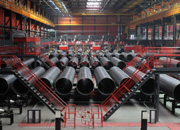 Threeway Steel is known as a professional supplier engaged in manufacturing and distributing a wide range of steel pipe, and our headquarter located the central part of China – Hunan and six associated factories throughout China.
Threeway Steel is known as a professional supplier engaged in manufacturing and distributing a wide range of steel pipe, and our headquarter located the central part of China – Hunan and six associated factories throughout China.
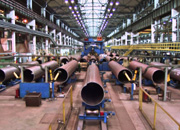 Threeway Steel is known as a professional supplier engaged in designing, manufacturing and distribution of a wide range of steel products with the headquarter located the central part of China – Hunan and six associated factories throughout China.
Threeway Steel is known as a professional supplier engaged in designing, manufacturing and distribution of a wide range of steel products with the headquarter located the central part of China – Hunan and six associated factories throughout China.
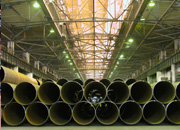 Threeway Steel is known as a professional supplier engaged in designing, manufacturing and distribution of a wide range of steel products with the headquarter located the central part of China – Hunan and six associated factories throughout China.
Threeway Steel is known as a professional supplier engaged in designing, manufacturing and distribution of a wide range of steel products with the headquarter located the central part of China – Hunan and six associated factories throughout China.
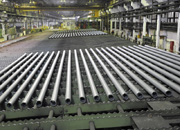 Threeway Steel is known as a professional supplier engaged in designing, manufacturing and distribution of a wide range of steel products with the headquarter located the central part of China – Hunan and six associated factories throughout China.
Threeway Steel is known as a professional supplier engaged in designing, manufacturing and distribution of a wide range of steel products with the headquarter located the central part of China – Hunan and six associated factories throughout China.
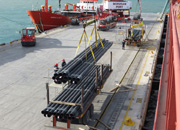 Threeway Steel is known as a professional supplier engaged in designing, manufacturing and distribution of a wide range of steel products with the headquarter located the central part of China – Hunan and six associated factories throughout China.
Threeway Steel is known as a professional supplier engaged in designing, manufacturing and distribution of a wide range of steel products with the headquarter located the central part of China – Hunan and six associated factories throughout China.

